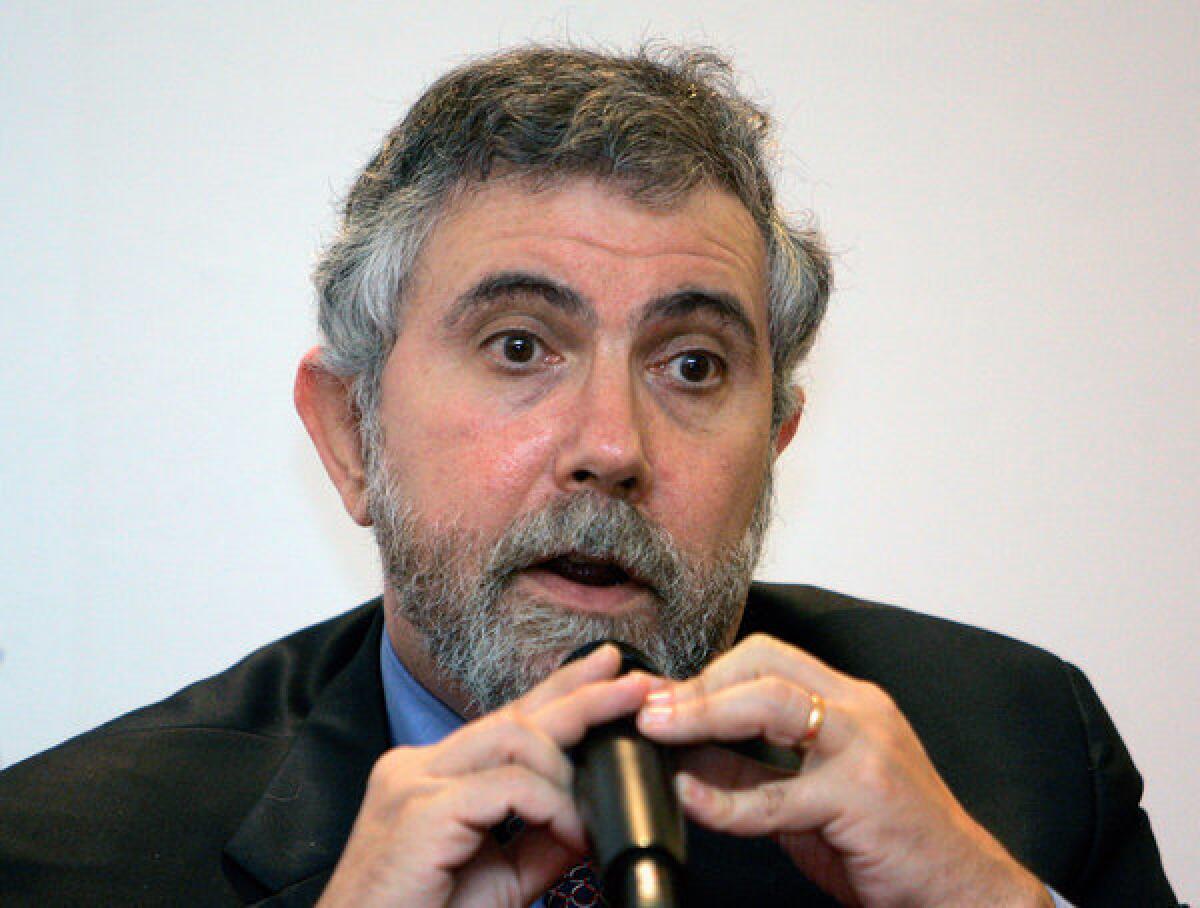At ‘fiscal cliff,’ a hearty few call for more spending

- Share via
The dominant voices in Washington have been possessed in recent days with finding the right combination of tax increases and spending cuts to avoid year-end budget outcomes allegedly so hazardous they are compared with a “cliff.”
If most Republicans and Democrats agree on little else, they seem to have reached a consensus that immediately reducing annual deficits, and paring back overall federal debt, is crucial to America’s long-term strength.
Yet a small but determined minority has a different view. Though they have had trouble getting much traction in the Capitol, they believe the majority in both parties is wrong and that the ailing economy needs more spending, not less.
They continue a determined crusade against the conventional wisdom.
New York Times columnist Paul Krugman, the L.A. Times’ Michael Hiltzik and an alliance of liberal Democratic lawmakers are among those leading the charge for an expansion of federal spending to bolster anemic U.S. economic growth.
QUIZ: How much do you know about the ‘fiscal cliff’?
Krugman, a Nobel Prize-winning economist, may be the most prominent advocate of the view that the greatest danger to the economy is the continued paucity of jobs. Krugman argues that only the government has the spending power to move enough people from unemployment lines back onto payrolls.
He wrote a couple of weeks ago that the cutbacks contemplated in Washington amount to an “austerity bomb,” and that “slashing spending and raising taxes on ordinary workers is destructive in a depressed economy, and that we should actually be doing the opposite.”
In contradiction of the conventional wisdom spouted on virtually every television news program, Krugman asserts: “The truth is that deficits are actually a good thing when the economy is deeply depressed, so deficit reduction should wait until the economy is stronger. As John Maynard Keynes said three-quarters of a century ago, ‘The boom, not the slump, is the right time for austerity.’ ”
The economist sees private-sector failures as principally responsible for struggling economies in America and Europe (for instance, housing bubbles hugely inflated by irresponsible lending policies) and governments then tamping down the public sector just when citizens most need assistance.
Like his East Coast compatriot, Hiltzik sees proof of the dangers of too much cutting across the Atlantic. “Harsh budget cuts in Greece, Spain, Portugal and Italy, along with austere fiscal regimes in France and Britain, have pushed the Eurozone back into recession,” Hiltzik recently wrote.
He called it “blindingly obvious” that the economy needs more government stimulus spending, to create jobs and prop up sagging infrastructure such as roads, bridges and the electrical grid.
Those arguments aren’t on the front burner in Washington today, but they are simmering slowly on progressive campfires.
PHOTOS: 2016 presidential possibilities
Sen. Richard J. Durbin (D-Ill.) said on Tuesday in a speech at the Center for American Progress that the U.S. badly lags other economies in infrastructure spending — with China investing 9% of its gross domestic product in such projects, Europe 5% and the U.S. 2.5%.
“That’s barely enough to repair and sustain what we have in place,” Durbin said. “There are no grand visions about infrastructure and there should be. Beyond the obvious highways and ports and airports, we ought to be thinking about our energy infrastructure.”
In the House, a group of liberal lawmakers is hoping to attach targeted stimulus programs to the overall “fiscal cliff” package, which will be dominated by cuts and tax increases.
Arizona Rep. Raul M. Grijalva, a member of the Progressive Caucus in the House, complained that “everything we are talking about right now is not going to create jobs … cuts to these discretionary programs are going to cost us jobs and put more stress on the government support systems that are getting less.”
Grijalva said he would insist that a jobs program be included in the settlement Congress and President Obama hope to reach before a Jan. 1 deadline He said the program would “put people to work and shore up our roads, our schools, our public safety.”
He said the exact parameters of the proposal remained to be worked out, though the congressman said he hoped it might compare in size to Obama’s proposed $500-billion Jobs Act of 2011.
So far, the Arizonan feels like the calls for more spending, not less, on key programs “is like a tree falling in the forest. Does anyone hear it?”
But he hopes the 80-plus members of the Progressive Caucus will hold out for the additional spending, even with pressure from Obama and congressional leaders to agree to a more austere plan.
“You have to see who is going to blink,” Grijalva said. “We just don’t know.”
Follow Politics Now on Twitter and Facebook
More to Read
Inside the business of entertainment
The Wide Shot brings you news, analysis and insights on everything from streaming wars to production — and what it all means for the future.
You may occasionally receive promotional content from the Los Angeles Times.











